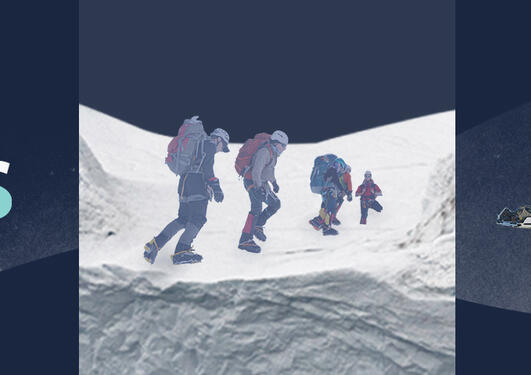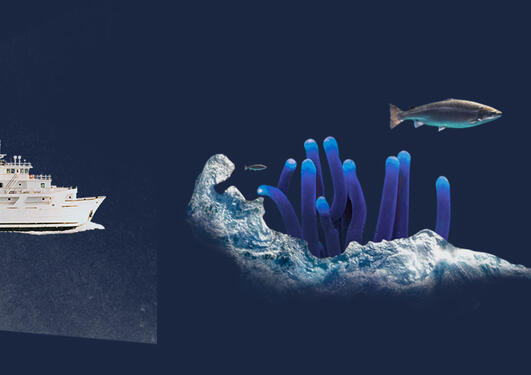Research possibilities for the MSCA SEAS postdoctoral research fellow in Salmon louse biology and immunemodulation
The information on this page is a supplement to the complete advertisement of the position in the recruitment-portal Jobbnorge. The full advertisement of this position in Jobbnorge will be available after august 1, and linked from this webpage. Call deadline is October 31, 2022.
Main content
Key information
One position | SEAS postdoctoral research fellow at Department of Biological Sciences |
Jobbnorge title | MSCA SEAS postdoctoral research fellow in Salmon louse biology and immunemodulation |
Topical frame | Salmon louse biology and fish immunology |
Supervisor-team | Associate professors Aina-Cathrine Øvergård and Christiane Eichner |
Mobility | For an incoming candidate (see mobility rules) |
Unit of employment | Department of Biological Sciences at University of Bergen |
Group affiliation | Research group Sea Lice Research Centre/Aqua medicine |
Thematic area and contact
This position is connected to the field of salmon louse biology and fish immunology. Knowledge of the host-parasite interactions of salmon louse (Lepeophtheirus salmonis) and its salmonid hosts is the basis to find solutions to combat salmon lice infestations on farmed salmon, which are currently the biggest challenge for the Norwegian aquaculture and a strong threat to wild salmonids. Improved salmon louse treatments strategies will improve the sustainability of salmon aquaculture, decreasing its negative effects on both farmed and wild salmonids. The research in this project is specifically aimed at vaccine development and includes a deeper understanding of the lice-fish interaction on a molecular level, vaccine design and immunological responses of the fish towards lice and vaccines.
The position is open to an incoming candidate, see mobility rules.
The successful candidate will be employed at the Department of biological sciences and included in the Sea Lice Research Centre, and Aqua medicine group.
Information about the supervisors, research group and research possibilities for the fellow is available below. For further details about the research possibilities please contact associate professor Aina-Cathrine Øvergård or associate professor Christiane Eichner.
Research possibilities and resources
The supervisor team
Aina-Cathrine Øvergård has been working with fish immunology and fish diseases since 2009, and for the last 9 years salmon louse has been the main pathogen of interest. In her research, the host-parasite interaction has been in focus, with an emphasis on how the louse modulates the immune response of the salmonid hosts. This by combining histology and microscopy techniques with RNA interference and transcriptional analysis.
Christiane Eichner has been working with salmon lice since 2004 with a focus on salmon louse biology. Her main interest is in generating a deeper understanding of the development of the louse and the host-parasite interactions on a molecular level both to generate better knowledge of copepod biology in general and as an applied tool to find new targets for vaccines or other treatments to combat the louse. Among others, she is working with transcriptomic analyses and RNA interference.
The research group
The Sea Lice Research Centre has broad experience in salmon louse research. Different techniques aimed at lice and fish biology are established. This applies both to molecular biology methods as well as to experimental challenges. Group members are skilled in diverse molecular techniques and are highly experienced in handling fish and lice. The group consist of 14 members, with frequent meetings for knowledge exchange. The group is also connected to the Computational Biology Unit (CBU), UiB.
Infrastructure and research environment
BIO is located at Marineholmen, which is a leading marine research cluster where education, research, innovation and business are co-located (Marineholmen - A Marine Powerhouse | Marine | UiB). The research group is located at the Bergen High-Technology Centre. It has both well-equipped molecular biology laboratories for DNA, RNA and protein work and a sea lice research established wet laboratory (LiceLab). Access to laboratories from BIO for diverse techniques is assured. Different lice strains ensure continually accessibility to lice from all stages and different fish tanks for various experimental setups. It is besides co-located with the Industrial- and Aquatic Research Laboratory (ILAB) having wet laboratories with additional fish tanks.
Research topic for the postdoctoral fellow
The research fellow will be connected to the ongoing “Salivax” project, which has the aim to investigate new strategies for a salmon louse vaccine. There will be possibilities for experimental work with lice and fish as well as in vaccine development both practically and bioinformatically.
Possibilities for collaboration with national/international research environments (e.g., for shorter visits)
Shorter visits to NMBU, Canada or Copenhagen can be a possibility.
Possibilities for collaboration with the industry
The project has no industry collaboration. If a vaccine is developed, collaboration with the industry will be established.
See the full advertisement in Jobbnorge
The full advertisement in Jobbnorge will be available from august 1, 2022, until call deadline October 31.
Important general information
Please be aware
- That until August 1st 2022 (official call opening), the information on this page must not be considered as final, as adjustments may be done! There might also be minor adjustments in the Guide for applicants and the templates needed for applying.
- That the application process is time-demanding and requires a close dialogue with name-given available faculty supervisor or contact who, close to the deadline, must sign a supervisor match declaration if an application is to be eligible.
- That some fields of research, especially within sensitive technology areas, might be enforced by Norwegian and international regulations regarding Control of the Export of Strategic Goods, Services and Technology. Candidates who by assessment of the application and attachment are seen to conflict with the criteria in these regulations might be prohibited from recruitment to UiB.

